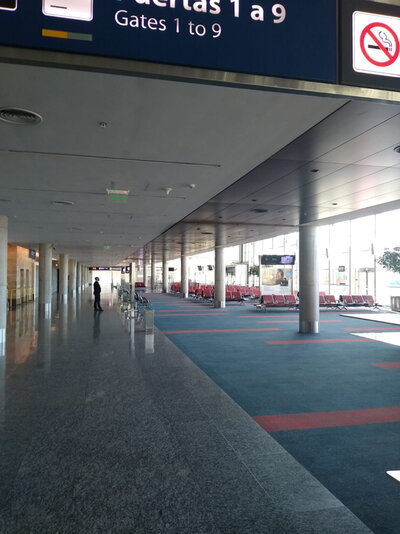by Claire Branigan (Ph.D. Candidate, Anthropology)
Claire Branigan is a Ph.D. candidate in the Department of Anthropology who has spent the last year living in Argentina while conducting field research for her dissertation on the Ni Una Menos movement

Argentina has taken perhaps one of the most aggressive stances against the COVID-19 pandemic in Latin America. With the economy in a slow recovery from a deep economic crisis, first-term President Alberto Fernandez of the Frente de Todos Peronist coalition party has prioritized preventing a massive outbreak, stating that “the economy will rise and fall but the dead will never come back”. Starting March 19, Fernandez announced a nationwide lockdown, with the police enforcing extremely limited exemptions. With a poverty rate looming around 35%, Fernandez authorized government benefits (a monthly stipend of 10,000 pesos, $155 USD) for the retired and the millions of Argentines working in the informal economy. Fernandez also authorized freezing prices on essential goods, prohibiting the firing of workers, and prohibiting rent increases during the national lockdown.
Initially, both sides of Argentina’s extremely polarized political spectrum embraced Fernandez’s actions. He enjoyed full support from the opposition conservative party of former president Mauricio Macri. On March 19, all of Argentina’s major newspapers, including those critical of the Fernandez government, published the same full-page headline reading: “We Only Stop the Virus Together”. Argentines were beginning to describe the fight against the pandemic as having the “Malvinas effect,” a nod to the extremely rare political unity only seen in the aftermath of the disastrous Falklands Islands War of 1982. This short-lived hope for a united front came to a halt after Fernandez warned Argentina’s business sector that their time had come to “earn less,” encouraging corporations to continue to pay their workers during the lockdown. Following these decrees, residents of Buenos Aires’s wealthy “Zona Norte,” and members of the conservative Juntos por el Cambio party, soon began their own nightly protest at 9:30 PM (following the 9:00 applause for the health workers), demanding that all politicians take a 40% pay cut.
As of April 8, Argentina’s Ministry of Health has reported 1,715 cases of COVID-19, with 63 fatalities. Approximately 1,000 tests are being administered daily within 123 laboratories. However Bloomberg reports that “the government adds cases deemed negative through medical exams to those confirmed by tests”. The military is retrofitting the national science and technology theme park “Tecnópolis” (shut down by the Macri administration) to become one of the world’s largest emergency hospitals, with over 2,500 beds. As of April 8, Fernandez has officially extended the lockdown with some new exemptions, including the reopening of banks.
Regionally, Argentina has taken a more hardline position than Chile (which has only empowered municipalities to administer lockdowns) or Brazil, which has yet to enforce any lockdown. As of April 8, Argentina has far fewer deaths per capita than these countries and the United States. Time will tell if the preventative measures enforced by the Fernandez administration will pay off, as the region braces for a humanitarian crisis and economic depression.